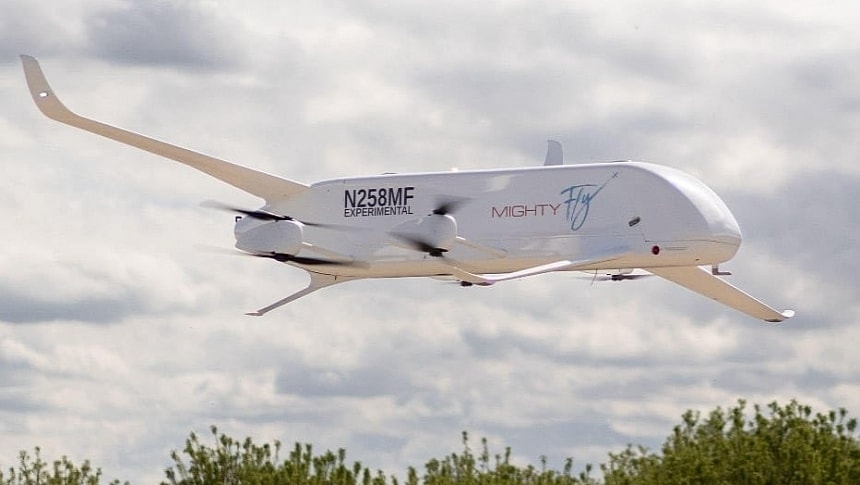The California-based MightyFly is gearing up for one of its most exciting phases so far. Only a few months after publicly unveiling its flagship cargo aircraft at the beginning of this year, the company has made tremendous progress, and it now has the green light from the FAA (Federal Aviation Administration) for two public flight debuts.
The exact time hasn't been officially confirmed yet, but the large autonomous cargo drone developed by MighyFly will soon conduct its first point-to-point deliveries in Michigan. These demonstration flights are the result of a collaboration between MightyFly and the Michigan Office of Future Mobility and Electrification.
Another partnership, this time with the US Air Force, will result in Cento's first public demonstrations for the military. The oversized drone will prove its ability to load, transport, and unload cargo fully autonomously.
The demonstration deliveries mark a huge turning point for the startup and are now possible due to a recent milestone related to certification. The company secured FAA approval for a flight corridor, and it actually became the first company in the US that makes large autonomous cargo eVTOLs to receive this approval.
What this means is that the autonomous Cento is allowed to operate between the New Jerusalem and Byron Airports in California, flying as high as 5,000 feet (1,524 meters). An additional SAC (Special Airworthiness Certification) further enables MightyFly to take the next step toward BVLOS (beyond visual line of sight) testing with the help of a chase airplane.
This approval milestone will basically propel MighyFly toward advanced, real-world testing of its large autonomous aircraft. Testing autonomous flight capabilities within the general aviation airspace, for instance, is a huge step forward. On the other hand, it allows MightyFly to conduct point-point demonstration deliveries, such as the upcoming ones in Michigan and with the US Air Force so that potential customers and partners can see what the Cento aircraft actually does.
Cento's commercial potential seems limitless. Due to its large size, hybrid capabilities, and autonomous operations, Cento could become a game-changer for all sorts of deliveries, from medical supplies and manufacturing components to military essential cargo.
The third-generation Cento comes with a larger cargo bay compared to the previous prototypes. The bay was also adapted to be compatible with standard cooler boxes for the safe transportation of blood bags and donor organs.
The dedicated ALMS system enhances the process of autonomous cargo loading. The Cento is able to open and close its cargo bay door autonomously, receive and eject packages, plus move and secure the packages inside the bay. Performance-wise, this hybrid drone promises a range of 600 miles (966 km) and a top speed of 150 mph (241 kph). The goal is to combine long-range capabilities with advanced autonomous operations.
Another partnership, this time with the US Air Force, will result in Cento's first public demonstrations for the military. The oversized drone will prove its ability to load, transport, and unload cargo fully autonomously.
The demonstration deliveries mark a huge turning point for the startup and are now possible due to a recent milestone related to certification. The company secured FAA approval for a flight corridor, and it actually became the first company in the US that makes large autonomous cargo eVTOLs to receive this approval.
What this means is that the autonomous Cento is allowed to operate between the New Jerusalem and Byron Airports in California, flying as high as 5,000 feet (1,524 meters). An additional SAC (Special Airworthiness Certification) further enables MightyFly to take the next step toward BVLOS (beyond visual line of sight) testing with the help of a chase airplane.
This approval milestone will basically propel MighyFly toward advanced, real-world testing of its large autonomous aircraft. Testing autonomous flight capabilities within the general aviation airspace, for instance, is a huge step forward. On the other hand, it allows MightyFly to conduct point-point demonstration deliveries, such as the upcoming ones in Michigan and with the US Air Force so that potential customers and partners can see what the Cento aircraft actually does.
Cento's commercial potential seems limitless. Due to its large size, hybrid capabilities, and autonomous operations, Cento could become a game-changer for all sorts of deliveries, from medical supplies and manufacturing components to military essential cargo.
The third-generation Cento comes with a larger cargo bay compared to the previous prototypes. The bay was also adapted to be compatible with standard cooler boxes for the safe transportation of blood bags and donor organs.
The dedicated ALMS system enhances the process of autonomous cargo loading. The Cento is able to open and close its cargo bay door autonomously, receive and eject packages, plus move and secure the packages inside the bay. Performance-wise, this hybrid drone promises a range of 600 miles (966 km) and a top speed of 150 mph (241 kph). The goal is to combine long-range capabilities with advanced autonomous operations.








